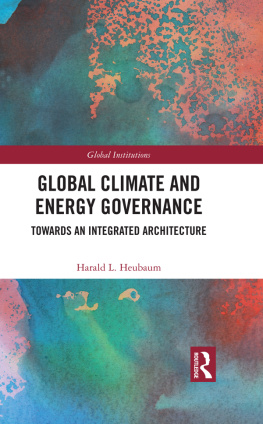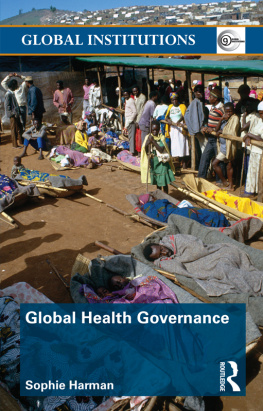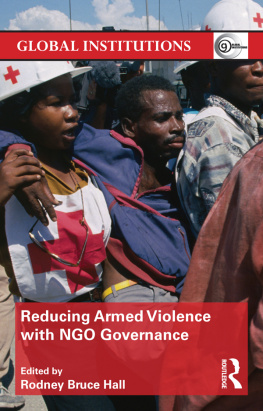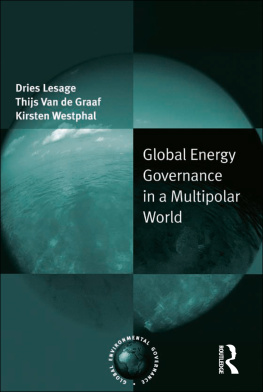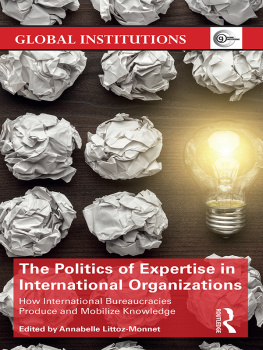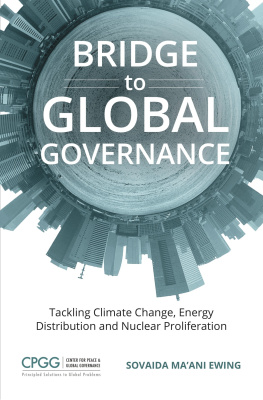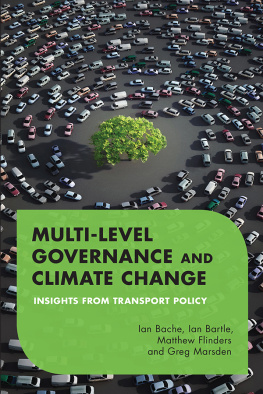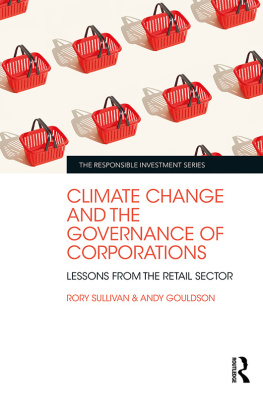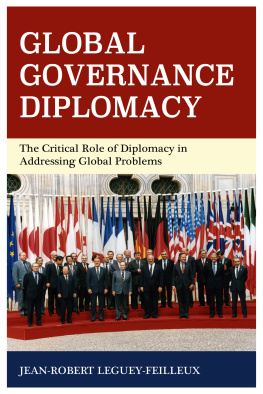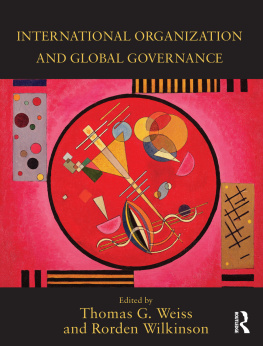Global Climate and Energy Governance
Tracing the changing activities of international bureaucracies active in global climate and energy governance, this book provides an in-depth analysis of processes of institutional innovation and governance integration between the two fields.
It shows that rather than the consequence of a designed strategy, governance integration the convergence of approaches and practices among different actors within one or between two or more governance architectures has come as the result of organizational changes arising from the international bureaucracies various efforts to pursue and broaden their mandate in a complex and dynamic global policy environment. Each of the three cases analyzed (the UNFCCC Secretariat, the IEA Secretariat, and the World Bank) began their life focused on particular activities that today, following periods of sustained organizational change, make up only part of their operations. Beyond creating greater synergies for cooperation across the governance architectures, improving policies, and mobilizing greater investment to tackle the climate emergency, the book shows governance integration to have contributed to preserving and expanding the role and relevance of all three international bureaucracies.
This book will be of interest to students and scholars of global climate and energy governance, climate policy, and international organizations and their bureaucratic arms. Practitioners will find this book useful in thinking about why innovation in governance emerges and how it may be directed.
Harald L. Heubaum is Senior Lecturer (Associate Professor) in Global Energy and Climate Policy at the Centre for International Studies and Diplomacy, Department of Politics and International Studies, SOAS University of London. He is also Deputy Director and Co-Founder of the SOAS Centre for Sustainable Finance.
Global Institutions
Edited by Thomas G. Weiss, The CUNY Graduate Center, New York, USA and Rorden Wilkinson, University of New South Wales, Sydney, Australia
About the series
The Global Institutions Series provides cutting-edge books about many aspects of what we know as global governance. It emerges from our shared frustrations with the state of available knowledgeelectronic and print-wisefor research and teaching. The series is designed as a resource for those interested in exploring issues of international organization and global governance. And since the first volumes appeared in 2005, we have taken significant strides toward filling many conceptual gaps.
The books in the series also provide a segue to the foundation volume that offers the most comprehensive textbook treatment available dealing with all the major issues, approaches, institutions, and actors in contemporary global governance. The second edition of our edited work International Organization and Global Governance (2018) contains essays by many of the authors in the series.
Understanding global governancepast, present, and futureis far from a finished journey. The books in this series nonetheless represent significant steps toward a better way of conceiving contemporary problems and issues as well as, hopefully, doing something to improve world order. We value the feedback from our readers and their role in helping shape the on-going development of the series.
A complete list of titles can be viewed online here: https://www.routledge.com/Global-Institutions/book-series/GI.
Small Countries, Big Diplomacy
Laos in the UN, ASEAN and MRC
Alounkeo Kittikhoun and Anoulak Kittikhoun
Global Climate and Energy Governance
Towards an Integrated Architecture
Harald L. Heubaum
Global Climate and Energy Governance
Towards an Integrated Architecture
Harald L. Heubaum

First published 2022
by Routledge
2 Park Square, Milton Park, Abingdon, Oxon OX14 4RN
and by Routledge
605 Third Avenue, New York, NY 10158
Routledge is an imprint of the Taylor & Francis Group, an informa business
2022 Harald L. Heubaum
The right of Harald L. Heubaum to be identified as author of this work has been asserted in accordance with sections 77 and 78 of the Copyright, Designs and Patents Act 1988.
All rights reserved. No part of this book may be reprinted or reproduced or utilised in any form or by any electronic, mechanical, or other means, now known or hereafter invented, including photocopying and recording, or in any information storage or retrieval system, without permission in writing from the publishers.
Trademark notice: Product or corporate names may be trademarks or registered trademarks, and are used only for identification and explanation without intent to infringe.
British Library Cataloguing-in-Publication Data
A catalogue record for this book is available from the British Library
Library of Congress Cataloging-in-Publication Data
A catalog record has been requested for this book
ISBN: 978-1-138-95815-9 (hbk)
ISBN: 978-1-03-216358-1 (pbk)
ISBN: 978-1-315-66133-9 (ebk)
DOI: 10.4324/9781315661339
Typeset in Times New Roman
by Newgen Publishing UK
Contents
Acknowledgments
No creative effort is ever truly the work of one individual alone. This book, too, would not have been possible without a community of support to whom I am truly grateful. In particular, I wish to thank the many current and former officials at the UNFCCC Secretariat, IEA Secretariat, and World Bank who so freely gave of their time and knowledge in interviews and background conversations, helping to shed light on processes of transformation and change in each of the three international bureaucracies. Organizational change and, ultimately, governance integration require agency and action. Together with others, these officials continue to work tirelessly to find solutions to some of the biggest challenges of our time and make the world a better place.
Abbreviations
ADBAsian Development BankAfDBAfrican Development BankARAssessment ReportCBDRcommon but differentiated responsibilitiesCCScarbon capture and storageCCXGClimate Change Expert GroupCDMClean Development MechanismCFUCarbon Finance UnitCIFClimate Investment FundCOPConference of the PartiesCO2carbon dioxideCTFClean Technology FundCTIClimate Technology InitiativeEIBEuropean Investment BankEUEuropean UnionEU ETSEuropean Union Emissions Trading SystemFSBFinancial Stability BoardGCCGlobal Climate CoalitionGCFGreen Climate FundGEFGlobal Environment FacilityG8Group of EightG20Group of TwentyGHGgreenhouse gasGWgigawattIBRDInternational Bank for Reconstruction and DevelopmentIDBInter-American Development BankIEAInternational Energy AgencyIFIinternational financial institutionIMFInternational Monetary FundIOinternational organizationIPCCIntergovernmental Panel on Climate ChangeIRinternational relationsIRENAInternational Renewable Energy AgencyJIJoint ImplementationMDBmultilateral development bankNAZCANon-state Actor Zone for Climate ActionNDCnationally determined contributionNGOnon-governmental organizationOECDOrganisation for Economic Co-operation and DevelopmentOPECOrganization of the Petroleum Exporting CountriesPCFPrototype Carbon FundPVphotovoltaicSCFStrategic Climate FundSDGsSustainable Development GoalsSEforALLSustainable Energy for AllSFDCCStrategic Framework for Development and Climate ChangeTCFDTask Force on Climate-related Financial DisclosuresUNUnited NationsUNCEDUnited Nations Conference on Environment and DevelopmentUNDPUnited Nations Development ProgrammeUNEPUnited Nations Environment ProgrammeUNFCCCUnited Nations Framework Convention on Climate ChangeUKUnited KingdomUSUnited StatesWBGWorld Bank GroupWEOWorld Energy OutlookWMOWorld Meteorological Organization

